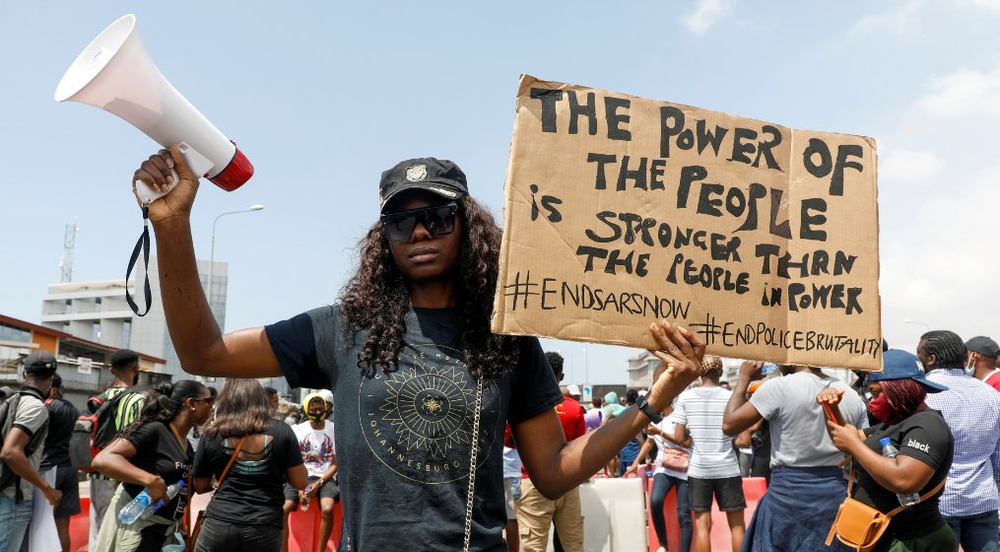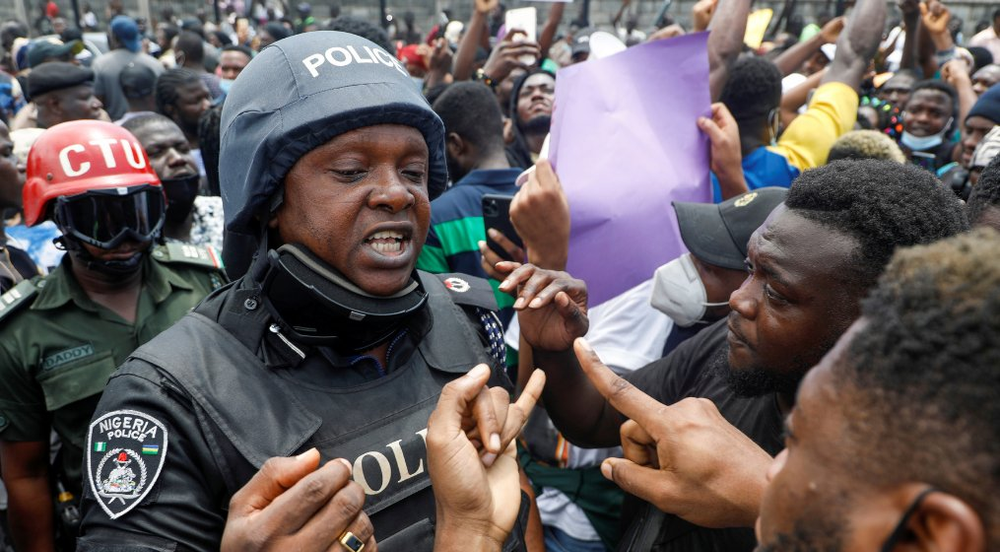On Friday, #EndSARS took Twitter by storm following nationwide protests in Nigeria calling for an end to police brutality in the country. Nigeria’s leading celebrities and activists organized mass protests across major cities. The protests were a result of weeks of anger and outcry online by Nigeria’s youth over claims of kidnapping, harassment and extortion by a police unit known as the Special Anti-Robbery Squad (SARS). The demands did not fall on deaf ears as Nigeria’s Inspector General of Police announced Sunday that SARS would be dissolved, though the news has been received with mixed feelings.

Protesters united over the past few days from being fed up by the numerous incidents of harassment, extortion, and police brutality. Thursday’s protest in Lagos Island was led by Folarin Falana, a lawyer and singer, and Runtown, another artist. They were joined by Nigeria’s biggest female performer, Tiwa Savage. Falana, known popularly as Falz, told CNN that he too had been a victim of harassment at the hands of the Nigerian police. “People have been positing online about it for years, but it has been the same sluggish attitude and response to it. Nothing has changes and people keep on being harassed. That’s why we have taken to the streets and we want the government to listen,” he said.
This is not the first time there has been an outcry against SARS and the unit has been censured before. In 2018, the country’s Vice President, Yemi Osinbajo, while deputizing for the President who was out of the country on vacation at the time, ordered the unit to be overhauled. In January of 2019, the police announced another ban on the same unit. But according to Amnesty Nigeria, not much has changed since those bans were put in place. Amnesty Nigeria’s Seun Bakare said “a similar ban on SARS did not end police brutality because it appeared the bans were simply done to assuage the swelling public anger at the time of the announcement and not intended to end police brutality.” One example of this is the Anti-Torture Act of 2017 which was made to protect Nigerians, including suspects and detainees, from torture and inhuman treatment. But there appears to be a lack of political will to enforce these laws according to Bakare.

(Photo: Aljazeera English via Twitter)
“I am marching for the ones that are not recognized,” said Falz. Videos from the protestors shared on Twitter Thursday night showed police officers forcefully dispersing the protestors, tearing down their sleeping tents, turning off the street lights and making verbal threats. Last Sunday, Nigeria’s police force responded by banning SARS from conducting any stop-and search activities. SARS, as well as other tactical police units, are now prohibited from “carrying out routine patrols and other conventional low-risk duties — stop and search duties, checkpoints, mounting of roadblocks, traffic checks, etc — with immediate effect,” Nigeria police chief Mohammed Adamu said on Sunday in a statement. “Voices and complaints on the issues of unprofessional conduct by some SARS operatives have been heard very loudly and clearly,” the statement read.
Protestors presented their demands to the Lagos State Assembly which held an emergency session Friday to listen to their demands. Feyikemi Abudu was one of the protestors outside of the state assembly on Friday. “There are many demands, but the main one is to scrap SARS, not to reform it but to completely end it. Another demand is compensation for victims of SARS brutality, both alive and dead. We also want a committee that will investigate and look into the present and past grievances around SARS brutality,” Abudu told CNN. She also raised 1.3 million naira (approximately $3,390) to buy food for those protesting and for medical treatment for those who were injured during the protests.
The hashtag #EndSARS and #EndPoliceBrutality has continued to trend on Twitter as young people shared their stories, photos, and videos they allege depict men in Nigeria’s police uniforms searching their cars and harassing them. Lagos-based entrepreneur Samuel Otigba recalls his encounters with members of the police he believed to be from the SARS unit. He said the encounters usually began with requests for bribes. He alleges that in May, he got into trouble because he would not give one of the officers a bribe when he was stopped after an evening out with his wife. His phone was searched and he was threatened by the officer who said to him, “You know if I shoot you, nothing will happen. The highest anyone will do is cry justice on Twitter.”

(Photo: Aljazeera English via Twitter)
This is just one of countless stories many in Nigeria have of their encounters with SARS. Nigeria’s tech community in particular has long complained about police harassment. Many tech entrepreneurs have expressed that they are targeted for having things like tattoos and dreadlocks, or simply for carrying laptops and smartphones. Amnesty International reported that it had documented 82 cases of police brutality in Nigeria between 2017 and 2020.
On Sunday, Nigeria’s Inspector General of Police announced that SARS will be dissolved, according to a police statement. Police spokesman Frank Mba added that all SARS officers are being redeployed immediately. While the news was welcomed by celebratory protestors, some expressed concern about men they viewed as dangerous staying on police payroll.
Prior to the announcement of the decision to disband SARS was announced, one man died and many others were injured as a result of police firing live ammunition and tear gas on young people who were protesting. The man was identified as Jimoh Isiaka and his death was confirmed by the governor of the Oyo State, Seyi Makinde. “I have received with deep sadness the news of the passing of one of our children, Jimoh Isiaka, who was shot during the ENDSARS protest in Ogbomoso,” Makined said on Saturday in a Twitter statement. Protestors in the capital Abuja reported that police used water cannons and fired live ammunition during a march.
While activists have campaigned against SARS for years, the violent videos that emerged online this week put a clear spotlight on precisely what demonstrators have been condemning…police brutality. Nigerian celebrities took up the cause helping the hashtag #EndSARS go viral. While the dissolution of SARS is one step in the fight against police brutality, protestors vow to continue marching in their demands to end police brutality in all forms and hold rogue officers accountable.
Powered by WPeMatico


